SPRING RENOVATIONS
February is a good time to start planning
by TurfPro Editor, Laurence Gale MSC, MBPR
It may seem early but most, if not all, of the county cricket groundsmen are already up and running, starting their pitch preparations for an early start to the season.
The first signs of spring have finally sprung, with large clumps of snowdrops appearing in my local woodlands - as ever an indication of spring is just around the corner.
February is a good time to start planning for the new growing season. Ensuring you have had your mowers serviced and repaired and ready for some spring renovations is a good idea.
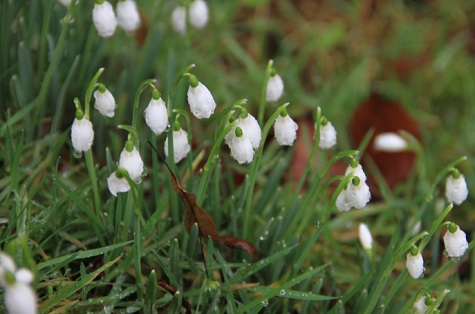
It may seem early but most, if not all, of the county cricket groundsmen are already up and running, starting their pitch preparations for an early start to the season - with many clubs having matches starting in late March, early April.
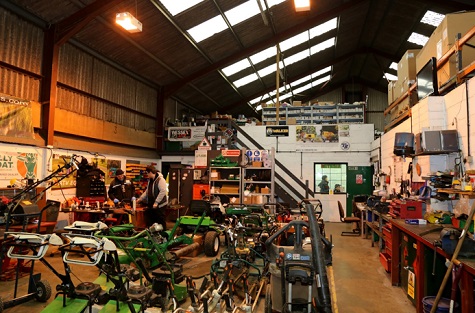
Many sports facilities, particularly the ones who perhaps did not invest in some autumn renovations last year, are still seeing the after effects of last year’s drought conditions.
The net result of that dry weather left us with many dried-out surfaces with large areas of dead grass, bare areas, thatch and a lot of weeds such as broad leaf plantains. Without doubt it will take time for these swards to recover naturally.
We’ve still got to get through February before we see any improvement of air and soil temperatures moving into double figures. Grass only effectively grows once we get above 10 degrees.
The soil temperature needs to be between 9-12 degrees Celsius for seed to germinate. This usually occurs from March through until September.
We need to invest in some timely spring renovation work to help restore these natural grass playing surfaces. We will also have to control any moss and algae that may have infested our sward.
Ideally at the back end of March / early April, when temperatures rise significantly, will be an ideal time to undertake your spring renovations.
Key operations of your spring renovations will be to: -
- Apply moss killer
- Clean out surface moss and fibre
- Aerate/de-compact the soil
- Topdress with a sand/soil dressing to maintain surface levels
- Overseed with some new grass seed to repopulate the lawn, sowing at a rate of 35grams M2
- Apply a spring NPK base fertiliser
A pre-seeding fertiliser can be used to help promote some growth; something like an 8:12:8 NPK or even a 7:7:7 NPK at 35g/m2 will be ideal.
In fact, I will be attending a Dennis / SISIS Cricket Seminar at St Albans School in February which will focus on spring renovations and some practical demonstrations.
As for football and rugby clubs, their seasons will be coming to an end in May, therefore it will be important they have secured the relevant funding and services of appropriate specialist contractors to carry out their end of season renovations.
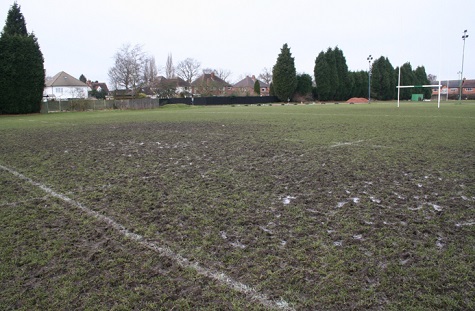
As a pitch advisor, one of the biggest problems for many grassroots clubs is the lack of investment in their pitches, especially in terms of carrying out some relevant renovation work. This can generally be seen as an expense and more often only completed once the pitch has deteriorated so much, they have no choice but to invest in some major repairs.
Clubs should try to secure a relevant budget to cover the expense of both a decent renovation and appropriate maintenance regime during the growing season.
We now have some tremendous products and services at our disposal we should make the most of and invest in them for the good of the club and its members.
Participating in a sport is essential for our wellbeing and has many health benefits. It does worry me when I see less and less youngsters remaining in sport. Many rugby, cricket and football clubs are running less teams these days compared to 10-15 years ago. In rugby we have seen a significant loss of teenagers leaving the sport, with many clubs struggling to run two teams. Cricket has also been hit with fewer youngsters staying on to play in the first team.
The lack of numbers makes it very hard for many of these clubs to remain viable and operational.
It is difficult to put a price on what these facilities bring to the community. From my experience they have played a part in educating, developing and producing well rounded adults who have the skills and abilities to be successful and contribute to our society.

It is imperative we ensure the future of these important assets. Local sports clubs and facilities are an essential hub of the community. We should encourage more participation and ensure these clubs remain sustainable for the next generation of sporting participants.
 |
|
 |  |
GOLF ENVIRONMENT AWARD WINNERS
Several titles presented
Aldeburgh Golf Club won the Environmental Golf Course of the Year 2019 recently, with several other accolades also presented.
The winners of the 2019 Golf Environment Awards (GEA) were announced at The Crown, Harrogate during BTME week recently, in a ceremony hosted by STRI Group and the R&A.
STRI ecology consultant, Rowan Rumball, said, “A huge congratulations to the winners and finalists of this year’s awards. We have been amazed by the work that golf clubs and greenkeepers are doing for the ecological and environmental wellbeing of their courses and within the local community.
“Environmental best practice is an important part of all golf clubs working remit and through the introduction of next year’s Home Nations awards we hope more clubs will be encouraged to enter the 2020 GEAs.”
The winners were:
Environmental Golf Course of the Year 2019 – Aldeburgh Golf Club
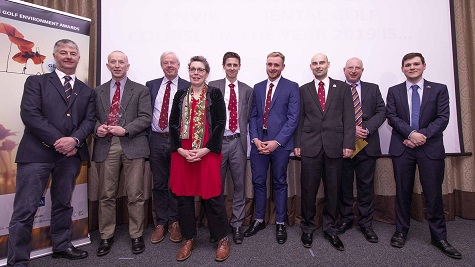
Aldeburgh Golf Club with Bob Taylor (l), and Rowan Rumball (r)
Creating what many thought to be impossible, an almost perfect blend of course and ecology to the point where it is hard to tell where one begins and another stops. All without sacrificing the playability of the course.
Conservation Greenkeeper of the Year 2019 – Phil Stain
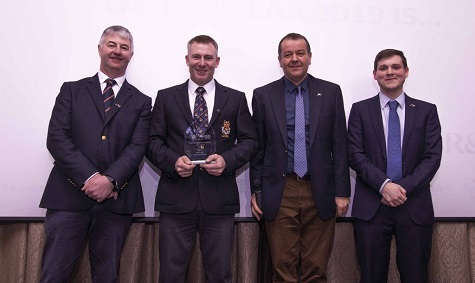
(l-r) Bob Taylor, STRI, Phil Stain, Notts Golf Club, Richard Owens, Tillers Turf and Rowan Rumball, STRI
Phil and his team’s knowledge of ecological practice to maintain a course that is in keeping with the surrounding country side and create great community engagement.
Outstanding Environmental Project of the Year 2019 – Wylihof Golf Club
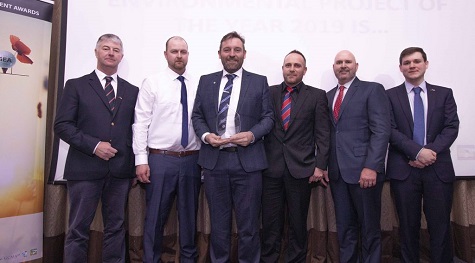
Wylihof Golf Club with Bob Taylor (l), and Rowan Rumball (r)
An innovative new design of ecological enhancement shows that we still have a lot to learn. Conservation is a young science and there is still plenty of room for new ideas.
Operation Pollinator 2019 – Corhampton GC
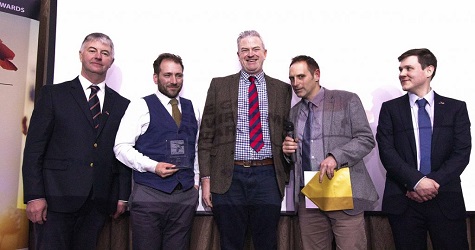
Corhampton Golf Club with Bob Taylor (l), and Rowan Rumball (r)
The club has shown that you have to be brave when it comes to habitat management, but the results of their efforts are well worth it creating big new expanses of habitat for pollinators.
Lifetime Achievement Award - Gordon Moir
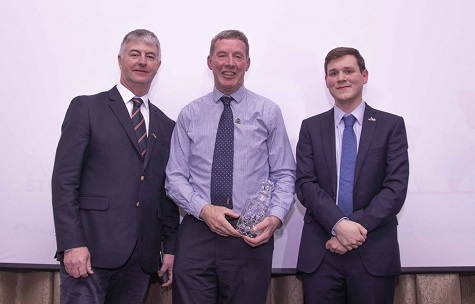
(l-r) Bob Taylor, STRI, Gordon Moir, St Andrews Links Trust (retired), Rowan Rumball, STRI
A Lifetime Achievement Award was also presented to Gordon Moir, retired Director of Greenkeeping at St Andrews Links Trust.
STRI head of ecology, Bob Taylor, said: “It was a real pleasure to be able to honour Gordon Moir at the Golf Environment Awards 2019 with a Lifetime Achievement Award, giving recognition to his dedication to ecology and environmental sustainability, and all that he has achieved during his illustrious career spanning over 27 years at the St Andrews Links Trust”.
 |  |
UK TURF SHORTAGE STATEMENT
Issued by TGA
Statement from the Turfgrass Growers Association hopes this year British turfgrowers will be able to "get back to some normality".
The Turfgrass Growers Association has issued an official statement regarding the shortage in UK turf.
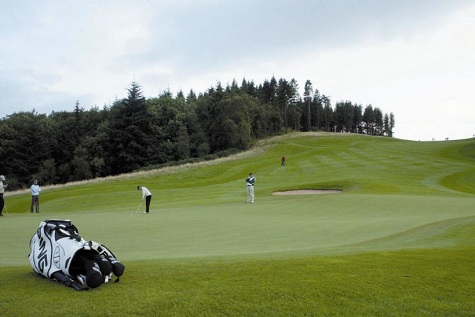
The statement read, "2018 was a year of extremes; starting with the 'Beast from the East' which hit the UK in early March and then a prolonged cold and wet period for the remainder of March and early April, the UK then headed into a record-breaking hot summer - the average temperature beating that of 1976.
"All agricultural industries battled the unusual weather and throughout the UK yields were diminished. The turf industry also faced similar pressures from the year’s weather; the difficult growing conditions and the increase in demand has caused a winter shortage of turf.
"Looking forward and assuming that this year will not see a repeat of last year’s weather conditions, British turf growers will be in a position to get back to some normality and begin to work on a slow but sure recovery."
EMPLOYER NOMINATIONS DOUBLED FOR STUDENT AWARD
Toro's greenkeeping prize
Entries into Toro’s Student Greenkeeper of the Year Award last year were up with over double the amount from employer nominations.
Entries into Toro’s Student Greenkeeper of the Year Award last year were up with over double the amount from employer nominations.
This is a fact attributed to commitment to career learning from golf club employers, course managers and head greenkeepers, says David Cole from award sponsor Reesink Turfcare.
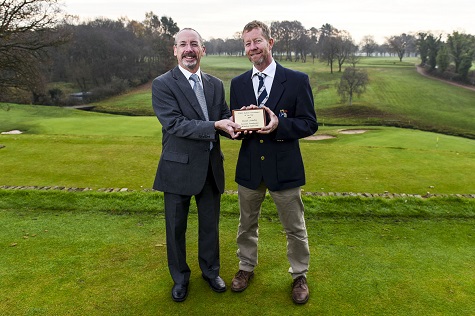
Course manager Steve Oultram from The Wilmslow Golf Club, right, receives his plaque for nominating the winner of the Student Award from Reesink’s MD David Cole
“These results were hugely pleasing to us. It demonstrates the faith employers have in the abilities of their students. We’re aware that without those who nominate their greenkeepers we wouldn’t find the talent we do, hence why we applaud those who let us know about their bright and shining stars.”
Proving the point in 2018 was course manager Steve Oultram from The Wilmslow Golf Club who nominated Daniel Ashelby winner of the Student Award and course manager Jon McMullen from Lee Park Golf Club who nominated winner Danny Patten for the Young Student Award.
Steve is heading to the Golf Industry Show in San Diego in February as part of his prize for nominating Daniel, while Jon has won a trip to Vidauban Golf Club in the South of France, one of the most exclusive European golf clubs there is, for nominating Danny.
Steve views the all-expenses paid trip to San Diego for nominating Daniel in his bid to win the coveted trophy as a great opportunity to bring home to Wilmslow first-hand knowledge on the latest products and services to benefit the golf industry.
He says, “I’m really excited about my trip to the Golf Industry Show, it’s going to be really beneficial to network with some of the industry’s leading people in golf and learn about what we may expect to see in the UK, and at The Wilmslow Golf Club, in the near future.”
Meanwhile, as only the third winner of the Young Award, Danny Patten has cemented his position as one of the very best young greenkeepers in the country, and Jon is excited to have the chance to visit Danny at Vidauban Golf Club.
He says: “Vidauban is known as one of the finest golf courses in the world and it’s a very exclusive club, so to see it myself, and to hear about Danny’s time there, is something I wouldn’t miss. It’s going to be amazing to experience the course and the way it’s run; it’s an example of excellence, so taking in as much as I can while I’m there is going to be a top priority.”
David Cole, managing director of Reesink Turfcare who was first involved in the awards in 1993, says: “We are very proud of the status the Student Award holds within the industry and the opportunity it has provided for career advancement over the years. The fact that employers are showing they do too by nominating their talented greenkeepers is a promising sign for the future of the industry.
“It’s important to remember that it’s not just the students who benefit from winning, their nominators do also. Not only do they receive an all-expenses paid trip abroad, but we mustn’t forget that the winners’ success is testament to the excellent support they receive from their employers, who we are delighted to be able to recognise.”
Both employers and lecturers can make nominations. Visit reesinkturfcare.co.uk/sgoty to find out how to make a nomination into the 2019 awards.
 |  |
BERNHARD SHARPENS ITS PORTFOLIO
With a new addition
BTME at Harrogate gave turf professionals their first opportunity to see Bernhard and Company’s Anglemaster 4500 - a new automated sharpening system
BTME at Harrogate gave turf professionals their first opportunity to see Bernhard and Company’s Anglemaster 4500 - automated sharpening system.
The company says the unit delivers even sharper accuracy. The use of RFID technology allows different users and set-ups to be easily recalled, making the new bedknife grinder the most flexible system within the range. Meanwhile the smart motors provide variable speed, enabling users to match the most efficient speed to the stone required for the material of the blade.

Bernhard says that working alongside the Express Dual 4250, its new drive adaptors and fully automated feed system through touchscreen operator interface mean that sharpening mowers has become much smarter than it has ever been before.
Steven Nixon, director for Bernhard and Company, said: “We have had a fantastic year at Bernhard and we are confident that the new additions to the range will provide equipment managers and mechanics with a greater choice of machines that adapt to different ways of working.”
Matt Bloomfield, engineering manager added, “We were extremely pleased to see the response we had at BTME to the Anglemaster 4500 and we are very excited to present yet more innovations at GIS.”
Bernhard will be at the GCSAA Golf Industry Show on stand 3652 on 6th and 7th February to present the Anglemaster 4500 and other new sharpening systems, as well as the brand new golf lighting rig from MLR.
 |  |
EGO LAUNCH 'INDUSTRY FIRST'
Powerload now available
EGO say they have tackled the problem of reloading line with its new ST1510E - Power+ Line Trimmer featuring Powerload technology.
EGO say they have tackled the problem of reloading line with its new ST1510E - Power+ Line Trimmer featuring Powerload technology.
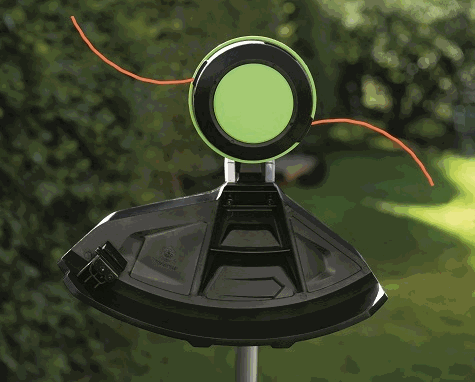
The product, which won an Innovation Medal at GaLaBau in October last year and a Technology Innovation Award at Bologne’s EIMA exhibition, is described by Ego as the industry’s first line trimmer tool with a fully automatic line re-loading system.
To load the ST1510E, users insert the trimmer line through the head of the tool. After a push on its activation button, the Powerload system then winds the line onto the spool in less than five seconds.
The company says the quick-adjust handle offers optimum balance and control with a 38cm cutting swathe. In addition, they say the line trimmer’s soft-start function and constant speed control ensures consistent trimming.
As with all EGO Power+ products, the ST1510E is powered by their 56V Arc Lithium battery.
Steve Roskell, marketing director (EMEA) at EGO, said, “This groundbreaking feature was specifically designed to resolve consumers’ number one pain point with line trimmers. Replacing line when it runs out. With this world first innovation, Powerload has finally put an end to these frustrations.”
For customers that are unsure about the power of battery technology, EGO offers a 30-day money back guarantee for all domestic users.
 |  |
JACOBSEN SUPPORTS STUDENT
From Staffordshire to South Africa
James Walker, a graduate of the African Turf Academy in Pretoria, South Africa, has praised Jacobsen for its commitment to education.
James Walker, a graduate of the African Turf Academy in Pretoria, South Africa, has praised Jacobsen for its commitment to education and helping to launch his greenkeeping career.

James Walker of JCB Golf & Country Club
James graduated from the African Turf Academy, which is supported by Jacobsen and the R&A, in 2015. James enjoyed success at the Academy based at the Silver Lakes Golf Estate and won the Student of the Year award in 2015.
Three years on, and James is now the assistant greenkeeper at JCB Golf & Country Club, the brand-new 18-hole golf course based at the construction equipment manufacturer’s headquarters in Staffordshire. The golf course is supplied by Textron Golf, which includes equipment and vehicles from Jacobsen, E-Z-GO, Cushman and Textron Fleet Management.
“It’s amazing that Jacobsen supported me throughout my education in South Africa, and now I am here at JCB which uses the equipment,” James said. “The African Turf Academy was the only one to offer an international qualification, which was run by Elmwood College, and Jacobsen was the only company willing to invest in education in the turf industry across South Africa. I must thank Jacobsen, the R&A and The African Turf Academy for all they have done for me in my career so far.”
The African Turf Academy offers an International Greenkeeping Qualification, a two-year full-time programme of study running in conjunction with the Tour Player Development Programme. On completion of the course, students receive an internationally recognised National Certificate in Greenkeeping from Elmwood College in St. Andrews, Scotland.
“I was introduced to Euan Grant at the Golf Industry Show in San Antonio,” James continued. “As the general manager at JCB Golf & Country Club, he was looking for greenkeepers to come and work at the new course. I was excited at the prospect; it sounded like an exciting project and something I was keen to be involved in.”
“James and I met at GIS in February 2018,” Euan grant explained. “As soon as we started to talk, I knew he was exactly the kind of person I wanted at the JCB course. He’s passionate about greenkeeping, extremely hardworking and down-to-earth and committed to his own professional development. I would also like to thank Jacobsen for giving people like James the opportunity to enter the turf maintenance profession and supporting the future of the industry.”
“I’m looking forward to my future here,” James concluded. “It’s a spectacular course with the best equipment and resources available, and whilst the climate is very different to South Africa, I’m adjusting well!”
 |  |
SUCCESSFUL CLASS ACTION AGAINST 8 LAWNMOWER MAKERS IN CANADA
Reaches $7.5m settlement
A settlement has been reached in a lawsuit against 8 major lawnmower makers that alleges they conspired to make their products sound more powerful in order to justify charging customers more money in Canada.
A $7.5 million settlement has been reached in a class action lawsuit in Canada against eight major lawnmower manufacturers that alleges they conspired to make their products sound more powerful in order to justify charging customers more money.

An image from the class action website where consumers can make their claims - thought to be worth $15 to $55 per mower
The Canadian broadcaster CBC reported that the settlement includes hundreds of thousands of mowers under at least 39 brand names, purchased in Canada between January 1, 1994 and December 31, 2012 and includes petrol-powered walk-behind or riding mowers, labelled at 30 horsepower or less.
The suit alleges Briggs & Stratton, Electrolux, Honda, Husqvarna, John Deere, Kawasaki, Kohler, MTD, Tecumseh and Toro mislabelled their products to show a higher horsepower rating than what was actually contained in the lawn mower.
Jonathan Foreman, a partner with Harrison Pensa, the firm representing the class action told CBC News that it is still not apparent how many people or organisations may be eligible to make a claim.
"You will have some people like landscaping companies, for example, who would buy multiple mowers," he said. "Then you'll have consumers and homeowners who might buy one and keep it for as long as 10 years."
Indviduals and organisations have until May 22, 2019 to file a claim ranging from $15 to $55 per mower, by filling out an online form on the class action's website.
The court has appointed a third party to receive and review potential claims, which could take up to a year to be paid after the claims deadline.
 |  |
JENSON CHIPS IN AGAIN
For chairty fundraising
For the second consecutive year Jensen woodchippers have offered their support to a charity Christmas tree collection run by Dorothy House Hospice Care which has raised over £26,000 this Christmas.
For the second consecutive year Jensen woodchippers have offered their support to a charity Christmas tree collection run by Dorothy House Hospice Care which has raised over £26,000 this Christmas, and £40,000 over the two years Jensen have been involved.
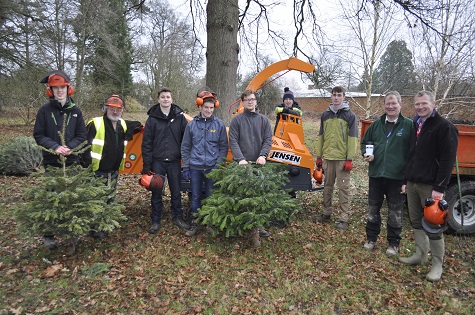
Jensen UK business manager, Bill Johnston, with Lackham students taking part in the January 2018 woodchipping activity
Once again Dorothy House and Wiltshire College & University Centre have joined forces for a Christmas tree collection and recycling scheme, with volunteers collecting more than 2,300 trees from across the region and delivering 300 of them to the college’s Lackham campus for chipping and recycling with support from Jensen.
Local hospice Dorothy House provides compassionate end of life care and support for patients with life-limiting illnesses and their families and carers in Bath and North East Somerset, Wiltshire and Somerset.
The Wiltshire College & University Centre Lackham site is a dedicated landbased campus providing qualifications in subjects such as agriculture, land and wildlife management and horticulture. Jensen are distributed in the UK by the Machinery Imports division of the T H WHITE Group, whose head office is based in Devizes, Wiltshire.
Jensen UK Business Manager, Bill Johnston, was delighted to spend the day at the Lackham campus with students from the Horticulture and Countryside Management departments, teaching them skills in the safe use of woodchippers and sharing his wealth of industry knowledge about the arboricultural sector and the Jensen woodchipper brand.
“We’re delighted to offer our support for this fantastic fundraising initiative in partnership with Dorothy House and Wiltshire College & University Centre once again” says Bill.
“Not only are we assisting Dorothy House in their esteemed efforts to recycle the trees but giving Lackham students valuable experience with the woodchippers and guaranteeing that the trees don’t go to waste, so everybody wins.”
Verity Clark, Community Fundraiser for Dorothy House Hospice Care said, “This was our third Christmas tree collection and we’re glad to have helped local people recycle over 2,360 used Christmas trees while also raising £26,000 of vital funds for Dorothy House. A big thank you to all our volunteers and supporters for their generous help and thanks also to all involved in recycling and chipping our trees at Wiltshire College Lackham.”
 |
|
 |  |
ADVERTISE YOUR JOBS HERE
Amazing success rates!
Advertise your recruitment needs on TurfPro Weekly Briefing and reach our targeted audience of recipients every week.
Contact Nikki Harrison for details - 01491 837117
|
 |  |
 |  |
 |  |
 |  |
 |  |
WORM CONTROL
Without carbendazim
by Dr Ruth Mann, head of research, STRI
Worm casting can be an issue for many grassed areas including sports surfaces, parks and lawns.
Worm casting can be an issue for many grassed areas including sports surfaces, parks and lawns.
There are around 25 native species and up to 34 exotic species of earthworms inhabiting UK soils. They favour moist, less acidic and medium textured soils, especially where organic matter is readily available. There are many benefits associated with earthworm activity, such as breakdown of organic matter and recycling of nutrients. Aristotle referred to earthworms as the ‘intestines of the earth’ due to their ability to digest and recycle nutrients.
However, earthworms are also responsible for producing casts on the surface of the grass. Earthworms can bring 40-50 tonnes of soil per hectare to the surface each year. These casts can have a detrimental effect, for example, if they smear they may seal the surface creating drainage impediment. They may also produce an uneven playing surface (Fig 1) or they bring weeds seeds to the surface and provide them with a seed bed to germinate and establish in. Annual meadow-grass ingress into fine turf surfaces may be as a result of seed dispersal from the rootzone through earthworm movement.
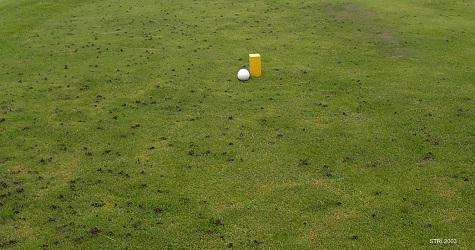
Fig 1: Wormcasts on golf tee
The three main species associated with casting are -:
- Lumbricus terrestris
- Apporrectodea longa
- Apporrectodea calignosa
Currently no lumbricides are authorised for earthworm control. Plant protection products that control worms must be authorised by the Chemicals Regulation Division (CRD) for that purpose. The use of carbendazim was withdrawn in September 2017. Prior to withdrawal, carbendazim was frequently detected in watercourses by water company monitoring, particularly during peak usage periods in the late summer/early autumn. This is a problem because there is a strict drinking water standard for pesticides of 0.1 mg /l (microgrammes per litre) and when concentrations in rivers exceed this value it is costly to remove them.
Additionally, if concentrations are high enough the treatment processes may be breached and result in drinking water being contaminated with trace levels of pesticide. Since the carbendazim withdrawal, several water companies have continued to detect carbendazim, with two companies reporting 84 detections above the 0.1 mg /l limit, with the highest result being above 22 mg /l. Water companies are currently sharing their carbendazim data with the Environment Agency and CRD. Not only is use of any unauthorised pesticide illegal, it could also be impacting on the local aquatic environment.
Therefore, we must focus on cultural control of earthworms. Control of earthworms starts with making the rootzone environment less favourable for them as a habitat. As a food source they will use organic matter, grass clippings, organic fertilisers, leaf litter, etc. Consequently, the less food the earthworm can find, the less likely it will be to remain in that area.
For example, research trials at STRI showed that boxing off clippings on a golf fairway reduced casting by 30%. Earthworms also prefer a neutral to alkaline soil pH. Therefore, encouraging a more acidic rootzone makes the area less hospitable. This can be accomplished using acidifying fertilisers during the growing season, such as ammonium sulphate or application of iron sulphate in late summer or application of pure sulphur. For example, boxing off clippings and applying 50 kg N/yr/ha ammonium sulphate increased the reduction in casting to 48% on the golf fairway (Fig 2).
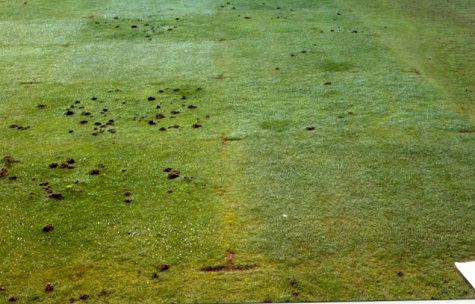
Fig 2: Reduction in earthworm casts using cultural control methods
Sand top dressing can also be used to discourage earthworms. The more abrasive the sand, the more irritating it can be to the earthworm’s integument (skin). Sand will also help to break down casts more easily on the surface and they will be less prone to smearing.
We need to manage the soil environment to favour the grasses and playing quality whilst minimising impact of earthworm casting. For these cultural control measures to work effectively, we need to adopt a long-term approach as unfortunately they will not produce results overnight.
Visit STRI
 |
|
|
|